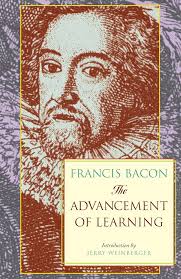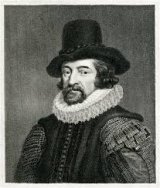The Advancement of Learning Page #13
The Advancement of Learning, published by Francis Bacon in 1605, is a foundational text in the history of science and philosophy. In this work, Bacon advocates for empirical research and the systematic organization of knowledge, laying the groundwork for the scientific method. The book critiques existing scholarly practices and proposes a new approach to learning based on observation and experimentation. It marks a significant shift towards modern scientific inquiry.
- Year:
- 1605
- 1,172 Views
Submitted by acronimous on August 11, 2024
Modified by acronimous on August 11, 2024
reduction of many of the ceremonies and ordinances. As in the law of the leprosy, where it is said, “If the whiteness have overspread the flesh, the patient may pass abroad for clean; but if there be any whole flesh remaining, he is to be shut up for unclean;” one of them noteth a principle of nature, that putrefaction is more contagious before maturity than after; and another noteth a position of moral philosophy, that men abandoned to vice do not so much corrupt manners, as those that are half good and half evil. So in this and very many other places in that law, there is to be found, besides the theological sense, much aspersion of philosophy. (10) So likewise in that excellent hook of Job, if it be revolved with diligence, it will be found pregnant and swelling with natural philosophy; as for example, cosmography, and the roundness of the world, Qui extendit aquilonem super vacuum, et appendit terram super nihilum; wherein the pensileness of the earth, the pole of the north, and the finiteness or convexity of heaven are manifestly touched. So again, matter of astronomy: Spiritus ejus ornavit cælos, et obstetricante manu ejus eductus est Coluber tortuoses. And in another place, Nunquid conjungere valebis micantes stellas Pleiadas, aut gyrum Arcturi poteris dissipare? Where the fixing of the stars, ever standing at equal distance, is with great elegancy noted. And in another place, Qui facit Arcturum, et Oriona, et Hyadas, et interiora Austri; where again he takes knowledge of the depression of the southern pole, calling it the secrets of the south, because the southern stars were in that climate unseen. Matter of generation: Annon sicut lac mulsisti me, et sicut caseum coagulasti me? &c. Matter of minerals: Habet argentum venarum suarum principia; et auro locus est in quo conflatur, ferrum de terra tollitur, et lapis solutus calore in æs vertitur; and so forwards in that chapter. (11) So likewise in the person of Solomon the king, we see the gift or endowment of wisdom and learning, both in Solomon’s petition and in God’s assent thereunto, preferred before all other terrene and temporal felicity. By virtue of which grant or donative of God Solomon became enabled not only to write those excellent parables or aphorisms concerning divine and moral philosophy, but also to compile a natural history of all verdure, from the cedar upon the mountain to the moss upon the wall (which is but a rudiment between putrefaction and an herb), and also of all things that breathe or move. Nay, the same Solomon the king, although he excelled in the glory of treasure and magnificent buildings, of shipping and navigation, of service and attendance, of fame and renown, and the like, yet he maketh no claim to any of those glories, but only to the glory of inquisition of truth; for so he saith expressly, “The glory of God is to conceal a thing, but the glory of the king is to find it out;” as if, according to the innocent play of children, the Divine Majesty took delight to hide His works, to the end to have them found out; and as if kings could not obtain a greater honour than to be God’s playfellows in that game; considering the great commandment of wits and means, whereby nothing needeth to be hidden from them. (12) Neither did the dispensation of God vary in the times after our Saviour came into the world; for our Saviour himself did first show His power to subdue ignorance, by His conference with the priests and doctors of the law, before He showed His power to subdue nature by His miracles. And the coming of this Holy Spirit was chiefly figured and expressed in the similitude and gift of tongues, which are but vehicula scientiæ. (13) So in the election of those instruments, which it pleased God to use for the plantation of the faith, notwithstanding that at the first He did employ persons altogether unlearned, otherwise than by inspiration, more evidently to declare His immediate working, and to abase all human wisdom or knowledge; yet nevertheless that counsel of His was no sooner performed, but in the next vicissitude and succession He did send His divine truth into the world, waited on with other learnings, as with servants or handmaids: for so we see St. Paul, who was only learned amongst the Apostles, had his pen most used in the Scriptures of the New Testament. (14) So again we find that many of the ancient bishops and fathers of the Church were excellently read and studied in all the learning of this heathen; insomuch that the edict of the Emperor Julianus (whereby it was interdicted unto Christians to be admitted into schools, lectures, or exercises of learning) was esteemed and accounted a more pernicious engine and machination against the Christian Faith than were all the sanguinary prosecutions of his predecessors; neither could the emulation and jealousy of Gregory, the first of that name, Bishop of Rome, ever obtain the opinion of piety or devotion; but contrariwise received the censure of humour, malignity, and pusillanimity, even amongst holy men; in that he designed to obliterate and extinguish the memory of heathen antiquity and authors. But contrariwise it was the Christian Church, which, amidst the inundations of the Scythians on the one side from the north-west, and the Saracens from the east, did preserve in the sacred lap and bosom thereof the precious relics even of heathen learning, which otherwise had been extinguished, as if no such thing had ever been. (15) And we see before our eyes, that in the age of ourselves and our fathers, when it pleased God to call the Church of Rome to account for their degenerate manners and ceremonies, and sundry doctrines obnoxious and framed to uphold the same abuses; at one and the same time it was ordained by the Divine Providence that there should attend withal a renovation and new spring of all other knowledges. And on the other side we see the Jesuits, who partly in themselves, and partly by the emulation and provocation of their example, have much quickened and strengthened the state of learning; we see (I say) what notable service and reparation they have done to the Roman see. (16) Wherefore, to conclude this part, let it be observed, that there be two principal duties and services, besides ornament and illustration, which philosophy and human learning do perform to faith and religion. The one, because they are an effectual inducement to the exaltation of the glory of God. For as the Psalms and other Scriptures do often invite us to consider and magnify the great and wonderful works of God, so if we should rest only in the contemplation of the exterior of them as they first offer themselves to our senses, we should do a like injury unto the majesty of God, as if we should judge or construe of the store of some excellent jeweller by that only which is set out toward the street in his
Translation
Translate and read this book in other languages:
Select another language:
- - Select -
- 简体中文 (Chinese - Simplified)
- 繁體中文 (Chinese - Traditional)
- Español (Spanish)
- Esperanto (Esperanto)
- 日本語 (Japanese)
- Português (Portuguese)
- Deutsch (German)
- العربية (Arabic)
- Français (French)
- Русский (Russian)
- ಕನ್ನಡ (Kannada)
- 한국어 (Korean)
- עברית (Hebrew)
- Gaeilge (Irish)
- Українська (Ukrainian)
- اردو (Urdu)
- Magyar (Hungarian)
- मानक हिन्दी (Hindi)
- Indonesia (Indonesian)
- Italiano (Italian)
- தமிழ் (Tamil)
- Türkçe (Turkish)
- తెలుగు (Telugu)
- ภาษาไทย (Thai)
- Tiếng Việt (Vietnamese)
- Čeština (Czech)
- Polski (Polish)
- Bahasa Indonesia (Indonesian)
- Românește (Romanian)
- Nederlands (Dutch)
- Ελληνικά (Greek)
- Latinum (Latin)
- Svenska (Swedish)
- Dansk (Danish)
- Suomi (Finnish)
- فارسی (Persian)
- ייִדיש (Yiddish)
- հայերեն (Armenian)
- Norsk (Norwegian)
- English (English)
Citation
Use the citation below to add this book to your bibliography:
Style:MLAChicagoAPA
"The Advancement of Learning Books." Literature.com. STANDS4 LLC, 2025. Web. 10 Mar. 2025. <https://www.literature.com/book/the_advancement_of_learning_3165>.








Discuss this The Advancement of Learning book with the community:
Report Comment
We're doing our best to make sure our content is useful, accurate and safe.
If by any chance you spot an inappropriate comment while navigating through our website please use this form to let us know, and we'll take care of it shortly.
Attachment
You need to be logged in to favorite.
Log In